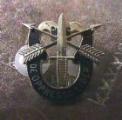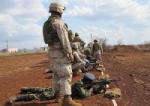Hey look at that, we agree on something. We did the same thing in Iraq when we took actual grass roots efforts at creating democracy by the Iraqi's and invaladated them and appointed intertrim leaders. Societies were strong central goverments are culturaly acceptable (South America for example) this tactic may work, but in the middle east we have to value the nature of the society we are working with. In Social Work we call it "meeting the client were they are at".
This I am far less sure about. Still not sold that all (or even most) insurgency is directly connected to "poor" goverance.Will they cure the disease of poor governance that gives rise to insurgency? Of that I am less optimistic.
Reed








 ) and prevent them from exploiting this information, in the WORST posible way, to our ownpeople? No. I don't think you could. So on the one hand our own publics, who tolerate the campaign (not war) in Afghanistan, precisely because we (the UK that is, not sure about the US) have built up some immunity to the campaign and, though not totally for the campaign, aren't willing to topple governments over it either. When we start to treat it like a proper campaign as part of a proper war (yes, we ARE at war!) support may wane. Especially if they think that society is being mobilised for war. However, in a different vein, conducting the kind of IO tactics you are suggesting would in real terms also tie our own hands behind our backs; if the threat/bluff fails then we have to honour the pledge and escalate. Alternatively, if they call our bluff and we fail to back up the threat we hand a propaganda (and stratgeic) victory to our enemies which would dwarf anything that came before it ( i.e., the "defeat" of the USSR). Then the unmentionables really do hit the fan. Just my thoughts.
) and prevent them from exploiting this information, in the WORST posible way, to our ownpeople? No. I don't think you could. So on the one hand our own publics, who tolerate the campaign (not war) in Afghanistan, precisely because we (the UK that is, not sure about the US) have built up some immunity to the campaign and, though not totally for the campaign, aren't willing to topple governments over it either. When we start to treat it like a proper campaign as part of a proper war (yes, we ARE at war!) support may wane. Especially if they think that society is being mobilised for war. However, in a different vein, conducting the kind of IO tactics you are suggesting would in real terms also tie our own hands behind our backs; if the threat/bluff fails then we have to honour the pledge and escalate. Alternatively, if they call our bluff and we fail to back up the threat we hand a propaganda (and stratgeic) victory to our enemies which would dwarf anything that came before it ( i.e., the "defeat" of the USSR). Then the unmentionables really do hit the fan. Just my thoughts.


Bookmarks